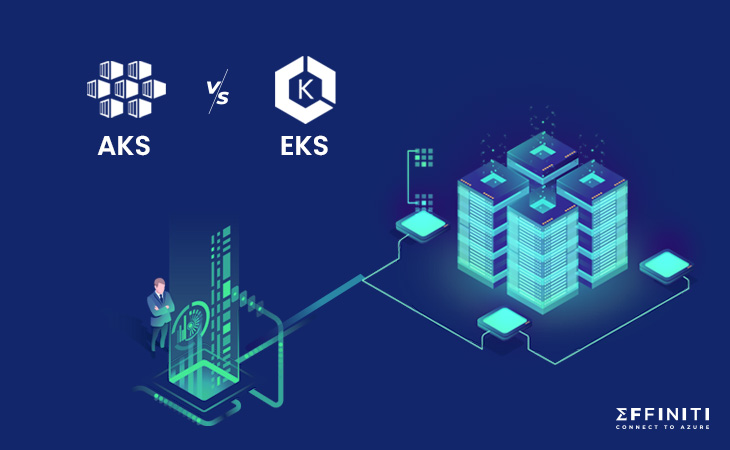Considered one of the fastest-growing open-source software projects in computing history, managed Kubernetes have made their mark in cloud space arena. Depending on the vendor, “managed” can refer to anything from full time hosting and operations to dedicated support and hosting with pre-configured environments. While the managed Kubernetes services started gaining traction back in 2014, it has been extending its wings at a rapid pace in recent years.
Today, several industries are planning their self-managed Kubernetes clusters to expand their cloud infrastructure. A recent survey by the Cloud Native Computing Foundation (CNCF) revealed that K8s, also known as Kubernetes, are used by 91% of respondents in 2020. According to industry experts, 50% of organizations have already acquired Kubernetes in 2021.
Talking about the current market scenario, cloud vendors like Amazon and Microsoft have already been reporting double digits growth with Amazon Elastic Kubernetes Service (EKS) and Azure Kubernetes Service (AKS).
These managed Kubernetes services help clients, run and orchestrate their containerized workloads without paying heed to the ins and outs of YAML configuration files or bothering about autoscaling, and cluster management.
Useful Link: Microsoft Readies Azure For 5G After AT&T Deal
Before digging deep into the major differences between Amazon Elastic Kubernetes Service and Azure Kubernetes Service, let’s know about the similarities first. Both EKS and AKS can run 100 clusters in each region. Nodes are distributed across node pools and each node pool can run 100 nodes.
Also, EKS provides integration with Amazon’s serverless container platform called Fargate. Similar to the Virtual Node feature in AKS, this allows running pods as container instances instead of full VMs.
Azure Kubernetes Service (AKS) Vs Amazon Elastic Kubernetes Service (EKS)

| Detail | Azure Kubernetes Service (AKS) | Amazon Elastic Kubernetes Service (EKS) |
| Overview | Azure AKS is a Microsoft product for hosting Kubernetes. It was made available to users in 2018. AKS also supports Apache Mesos and Docker Swarm along with Kubernetes | Amazon EKS was officially announced in June 2018. The American tech giant suggested users to implement its cluster orchestrator platform |
| Functionality | AKS can easily deploy and manage its application with a completely managed Kubernetes service. It has one of the most significant offerings in the industry, providing serverless Kubernetes called Virtual nodes, which give many advantages to the rich and consistent API services by Kubernete | EKS uses Kubernetes to run the application on AWS to provide greater benefits in terms of not needing to install, maintain, and operate Kubernetes nodes. It automatically scales and manages the containerized application on AWS |
| Automatic Upgrades | The Microsoft product is not a fully automatic solution; it has a semi-manual process to upgrade its components to the latest versions. A fully automatic solution is in the development stage | The amazon product doesn’t allow automatic upgrades. Users have to manage manually to control workers nodes and control panel every time |
| Price | Azure services don’t charge anything as it is a free container service. However, you have to pay for virtual machines, associated storage and consumed networking resources | EKS charges 10 cents for every 1 hour on the control panel. It’s a low price when compared to other services. AWS is the most popular and widely used around the world to manage Kubernetes services |
| CLI Support | Yes | Yes |
| Operating System | Linux: Ubuntu
Windows: Windows server 2019 |
Linux: Amazon Linux, Amazon Machina Image (AMI), Bottlerocket OS, Bring-Your-Own-OS, Ubuntu
Windows: Windows server 2019 |
| CNCF Kubernetes conformances | Yes | Yes |
| Nodes | Auto repair is available for nodes in AKS | It supports bare metal nodes |
| Quota Limit | Azure permits 1000 nodes per cluster | Amazon permits 3000 nodes per cluster |
| Resource Monitoring | AKS monitors for application insights and containers | Third-party only |
| Container Run Time | Containerd is the default run time for AKS. It supports node pools and the creation of clusters | Docker |
| Container Networking | It has Azure CNI | It has Amazon VPC CNI |
| Security | Azure manages encryption keys for users | Encryptions keys are customizable in Amazon |
| Availability | According to service level agreements (SLAs), EKS commits to provide 99.5% uptime | According to service level agreements (SLAs), AKS commits to provide 99.95% uptime |
In a nutshell

AKS and EKS are champs when it comes to Kubernetes execution. While both the programs are robust, AKS possesses an edge over its counterpart as AKS is relatively much more cost-effective. This is a massive advantage as money is a vital aspect for all. This is the primary reason as to why Effiniti strong-arms its clients with AKS and propels their productivity to new heights.
So, reach out to Effiniti and walk away with a solution which shall unlock your potential.
More Technology News:
- Microsoft Bolsters Defender to Fend Off Log4j Vulnerability Attacks
- Microsoft Warns Its Azure Customers of The Dangerous NotLegit Flaw
- Microsoft Expands Azure Footprint in India with New Availability Regions
- Microsoft Joins Forces with Airbus to Expand Azure Space
- Microsoft Goes Extra Mile to Make Azure Much More Resilient

